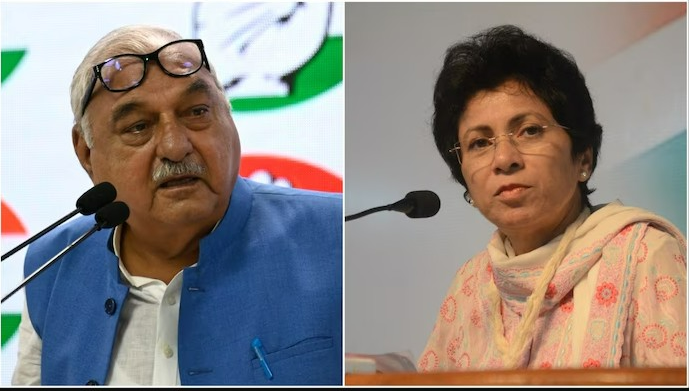Power Struggle in Congress: Kumari Selja Sidelined Ahead of Haryana Polls
Total Views |
As the Haryana Assembly elections draw near, scheduled for October 5 with results to be announced on October 8, the political landscape is abuzz with shifts that could reshape the state’s dynamics. Amidst this, the Congress party seems to have marginalized Kumari Selja, a prominent Dalit leader known for her strong grassroots connections in the state. Despite her long-standing loyalty and significant influence, Selja has been sidelined to bolster the standing of former Chief Minister Bhupendra Singh Hooda.

Selja’s recent political momentum was abruptly curtailed, suggesting a deliberate effort to reduce her role. Rahul Gandhi, who has played caste politics for electoral gains and boasts of championing marginalized communities, Selja's voice appears to have been suppressed. This speaks high volumes of hypocrisy and double standards.
It is pertinent to mention that during the recent Lok Sabha elections, Selja criticized the party’s poor performance, attributing it to unfair ticket distribution. She accused Hooda’s camp of favoring outsiders over loyal candidates, further highlighting internal disparities.
Out of the 90 seats in Haryana, Congress is fielding candidates for 89, with 72 of them loyal to Hooda. In contrast, only nine candidates are aligned with Selja, underscoring the sidelining of Dalit leaders. Her efforts to secure tickets for her supporters, such as Vidya Rani Danoda and Himmat Singh, were thwarted, illustrating Hooda’s tight grip on decision-making within the party.
After the Lok Sabha elections, Selja positioned herself as a potential Chief Ministerial candidate and expressed interest in contesting the Assembly elections. However, a directive from the leadership barring sitting MPs from contesting derailed her plans.
The marginalization of Kumari Selja not only reflects a personal setback but also unveils broader power dynamics within Congress. It exposes the party's internal strategies and challenges its claims of Dalit representation, with influential leaders like Hooda playing a key role in shaping the party's trajectory.

Selja’s recent political momentum was abruptly curtailed, suggesting a deliberate effort to reduce her role. Rahul Gandhi, who has played caste politics for electoral gains and boasts of championing marginalized communities, Selja's voice appears to have been suppressed. This speaks high volumes of hypocrisy and double standards.
It is pertinent to mention that during the recent Lok Sabha elections, Selja criticized the party’s poor performance, attributing it to unfair ticket distribution. She accused Hooda’s camp of favoring outsiders over loyal candidates, further highlighting internal disparities.
Out of the 90 seats in Haryana, Congress is fielding candidates for 89, with 72 of them loyal to Hooda. In contrast, only nine candidates are aligned with Selja, underscoring the sidelining of Dalit leaders. Her efforts to secure tickets for her supporters, such as Vidya Rani Danoda and Himmat Singh, were thwarted, illustrating Hooda’s tight grip on decision-making within the party.
After the Lok Sabha elections, Selja positioned herself as a potential Chief Ministerial candidate and expressed interest in contesting the Assembly elections. However, a directive from the leadership barring sitting MPs from contesting derailed her plans.
The marginalization of Kumari Selja not only reflects a personal setback but also unveils broader power dynamics within Congress. It exposes the party's internal strategies and challenges its claims of Dalit representation, with influential leaders like Hooda playing a key role in shaping the party's trajectory.







